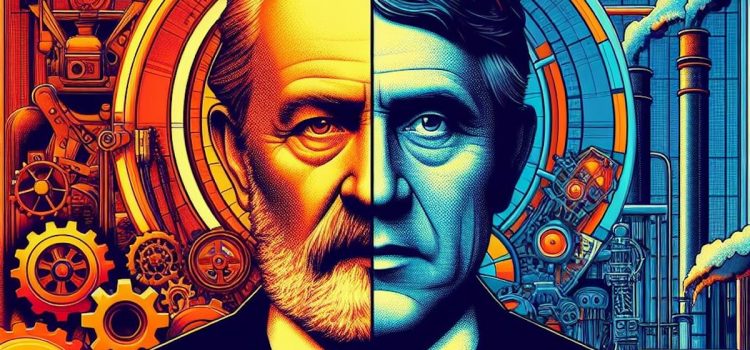

This article is an excerpt from the Shortform book guide to "Trust and Inspire" by Stephen M.R. Covey. Shortform has the world's best summaries and analyses of books you should be reading.
Like this article? Sign up for a free trial here.
Are you a modern leader or a throwback to the Industrial Age? What if you could hit the nail on the head when it comes to what’s required in leadership today?
In Trust and Inspire, Stephen M. R. Covey argues that the fundamental nature of work has changed since the industrial era, necessitating a corresponding shift in leadership. He discusses the difference between industrial and modern work and explains why leaders must evolve to keep up.
Read more to understand Command and Control vs. Trust and Inspire leadership.
Command and Control Leadership Is Tailored for Industrial-Era Work
Whether you realize it or not, a Command and Control vs. Trust and Inspire leadership debate is going on behind the scenes in today’s workplace. To shed light on the distinction, Covey begins the discussion by going back to the industrial era. At that time, workers mainly performed manual tasks in which quality depended on speed and effectiveness. As such, leaders used extrinsic motivators (such as threats and rewards) to encourage employees to work faster and harder.
Command and Control leaders weren’t concerned with employee engagement and inspiration because those things didn’t impact work quality. For example, factory line workers assembled products of the same quality regardless of whether they were inspired to do so because the process was streamlined and materials were uniform.
(Shortform note: Research suggests that industrial-era workers may indeed have lacked autonomy, work complexity, and intrinsic motivation, and that the absence of these factors may have left lasting psychological effects on communities previously dominated by industrial work. For example, industrial communities sprang up around coal mines in the US and UK in the 19th century. Even though many of these industries have closed, the people currently living in these areas report lower life satisfaction and more unhappy personality traits: They’re more emotionally unstable, angry, and anxious, have lower levels of self-control and self-management, and are less social, outgoing, and driven to have fun.)
Trust and Inspire Leaders Are Required for Modern Work
Covey argues that, unlike industrial work, most modern types of work aren’t streamlined or uniform. Therefore, quality work requires not just speed and effectiveness, but high levels of creativity, innovation, and collaboration. This is because most employees today perform either knowledge– or service-based work. Knowledge work, Covey says, requires continuous learning, idea generation, innovation, and collaboration, while service work requires the ability to connect with others.
(Shortform note: While Covey describes the characteristics of knowledge work, he doesn’t explicitly define it. Knowledge work hinges on a person’s expertise in a given area and their ability to think critically and solve problems—for example, architects and researchers can be considered knowledge workers.)
Further, Covey explains that employees can only develop their creative, innovative, and collaborative abilities when they’re fulfilled by and inspired to improve their work. This is because employees who are fulfilled and inspired are more engaged, and greater engagement correlates with higher levels of creativity, innovation, and collaboration.
As such, traditional leaders can no longer effectively encourage quality work. Instead, leaders must evolve in order for their organizations to thrive—they must inspire their employees and help them reach their full potential. Covey refers to this evolved leader as a “Trust and Inspire” leader.
| “Trust and Inspire” vs. Complexity Leadership Theory Many of Covey’s ideas about the shift from industrial-era to knowledge-era leadership are consistent with the long-standing Complexity Leadership Theory (CLT). CLT was introduced in the research article Leadership in Complex Organizations by Russ Marion and Mary Uhl-Bien in 2001—roughly 20 years before the publication of Trust and Inspire—and it has been a major area of research in the field of organizational communication ever since. CLT contends, like Covey, that: • In the knowledge era, learning, creativity, innovation, and collaboration are crucial for quality work. • Leaders must inspire employees to be engaged and committed to their work to produce quality results. • Leaders can inspire employees by enabling them (helping them reach their full potential and adapt). • Industrial-era leadership methods are no longer effective because they control, rather than enable, employees. |

———End of Preview———
Like what you just read? Read the rest of the world's best book summary and analysis of Stephen M.R. Covey's "Trust and Inspire" at Shortform.
Here's what you'll find in our full Trust and Inspire summary:
- How to inspire employees to maximize their work quality using trust
- The five doctrines inspirational leaders believe in
- The three commitments you must adopt to become an inspirational leader






